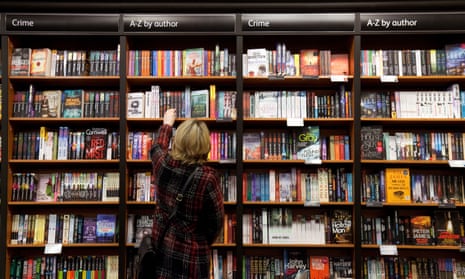Until this week, I thought that at least we could be consoled by fiction. That we still had the borderless joys of stories to fend off the dark forces of xenophobia and insularity. Culture is crucial in times of political uncertainty or crisis, and encountering other people’s stories in fiction seems like the surest way to keep our inner, imaginative boundaries open.
Except that we’re not encountering other people’s stories because they’re not being published. At least, not in Britain. The novelist Robyn Travis this week gave an inspirational talk on his struggle to find a publisher for his debut novel, Mama Can’t Raise No Man, about prison life and masculinity, and then to fill the 1,300-seater Hackney Empire in London for its launch this autumn. Go Robyn. Less inspiring was the fact that Travis, according to his publisher Crystal Mahey-Morgan, was most likely the only male black debut novelist to have been published in Britain this year.
Mahey-Morgan says there must be a “flaw in the industry” but no one in publishing should claim to be particularly shocked. A survey earlier this month by the Bookseller magazine found a “shockingly low” number of black, Asian or minority ethnic authors among the UK’s top 500 titles. Before that, a 2015 report, Writing the Future, found a glaring lack of inclusion across every level of a stubbornly white, middle-class publishing world.
But we do need to be shocked, because it is disturbing and shameful that of all the debut novels the nation’s publishers have championed in 2016, and from the entire pool of fierce new talent that literary agents and scouts have scoured the country for, it appears only one new black male voice has emerged, of an estimated 1000 debuts.
Publishers do appear to be more amenable to debut novels by minority women, with what seems like a concerted effort to push novels like Kit de Waal’s acclaimed debut, My Name is Leon. But the absence of male writers matters because we know from research that men are less likely to buy books written by women (which is why some female authors have hidden their gender behind initials on book jackets).
Mahey-Morgan argues for greater diversity in the boardroom, over the entry-level training schemes that so many publishers are now introducing to make their teams less white. She is right to push for a greater top-level minority presence inside publishing houses, but it will take a lot more to achieve the trickle-down effect of seeing actual books by black and Asian authors hitting shelves. The problem is so entrenched, unconscious, and institutionalised that the entire culture of an industry needs to change. We know there is plenty of talent out there among young minority writers, and no one in the book world is deliberately obstructing the discovery of the next Zadie Smith. Publishers just can’t recognise this talent in the same way they do a white British author’s.

There is a greater caution around taking on black and Asian novelists, a bigger concern about how they will be marketed. Then they are expected to produce a certain kind of story. Some young writers say they have been urged to “add a black character” into their manuscript by their agents or mentors, when all they wanted to do was write science fiction or crime thrillers or sex romps, and not about race at all.
This straitjacketing of the imagination means “identity fiction” becomes its own genre, with a tacit racism built into it so that white experience becomes the universal story, and minority ethnic stories are a specialist add-on to that human experience, presumably for the table of books by “British Black Writers” at Waterstones.
It is particularly galling that British publishers have drawn a near blank in diversity in the year that Paul Beatty, a black American, won the Man Booker prize. Looking back at the Booker’s 47-year history, of the non-white winners only Salman Rushdie and Kazuo Ishiguro were British. Perhaps we can only recognise and reward writing by minorities when its subject matter is not uncomfortably close to home – and that includes Rushdie’s work, which is international in tone and mostly subcontinental in its content.
Some of the strongest ethnic minority voices in literary fiction and poetry now are American – Colson Whitehead, Hanya Yanagihara and Claudia Rankine. These aren’t debut authors but if we don’t find new British voices, our literary establishment will never extend itself beyond Zadie Smith and that tiny gang.
And Britain will continue to dream in white, because that is what we are doing in the body of literature we are creating as a nation. Chimamanda Ngozi Adichie has talked of “the danger of a single story”, and how she wrote stories of the blue-eyed, blonde-haired people she read about as a child in Nigeria. Her seven-year-old imagination replicated those stories, however incongruous they were to her own African reality.
That incongruity can turn ethnic minority children off reading altogether, when they can’t see themselves in the books they read. It can also narrow the capacity for empathy for the rest of us.
So many worlds are captured in fiction and we read to escape into, and understand, these as much as we read to recognise our own world. If we don’t do enough of the former and too much of the latter, it will lead us down a path which ends with a Brexit of the imagination. And who would want that?

